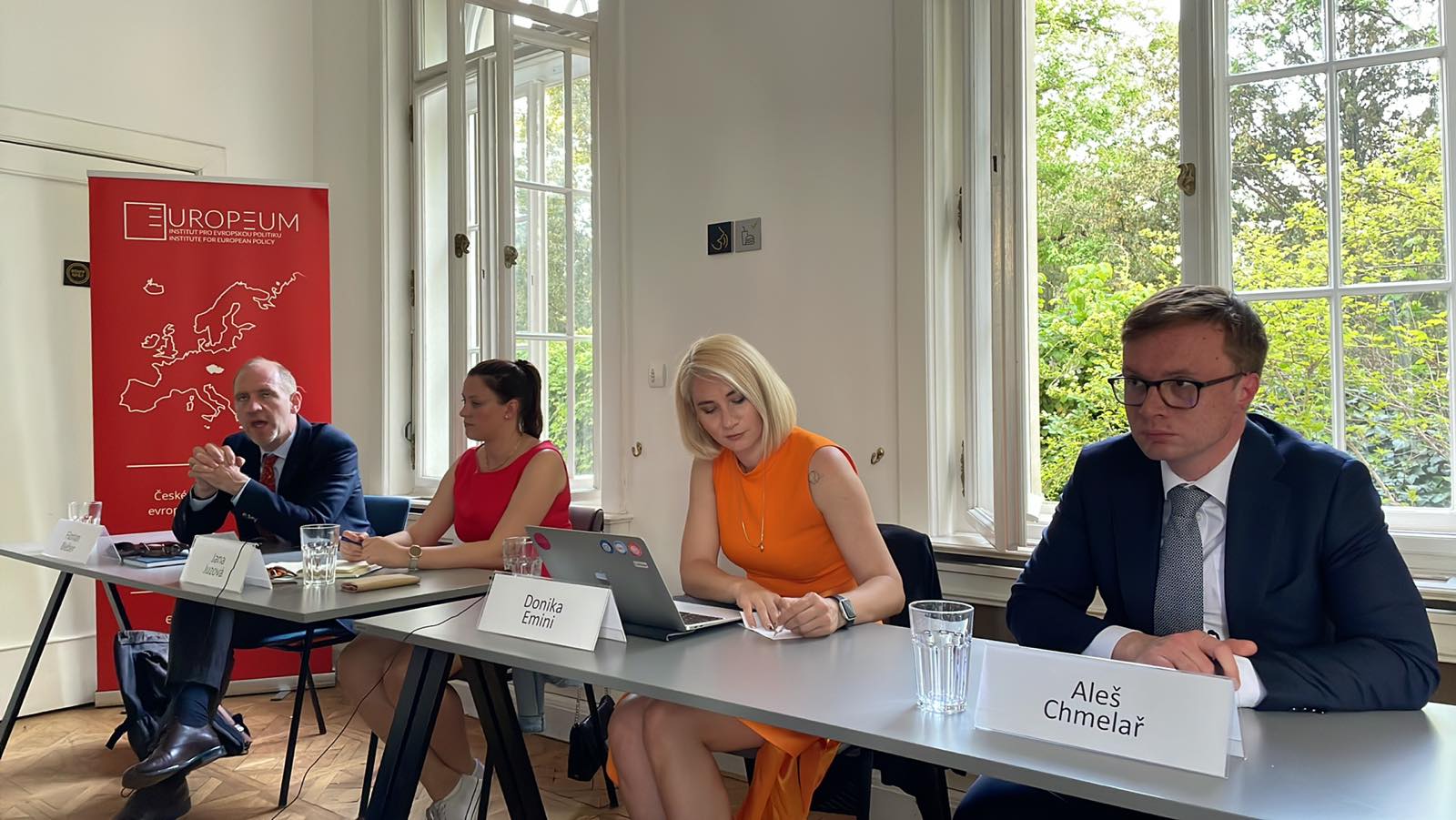
The discussion "Implications of the Russian Invasion of Ukraine for the Western Balkans: Challenges and options for the Czech Presidency” was organised by the the Balkans in Europe Policy Advisory Group (BiEPAG), the European Fund for the Balkans (EFB) and the Institute for European Policy EUROPEUM on May 11, 2022 in Prague.
BiEPAG Members Florian (BiEPAG Coordinator, Director of the Centre for Southeast European Studies, Universität Graz) and Donika Emini (Executive Director of CiviKos Platform) together with Mr. Aleš Chmelař (Deputy Minister for European Issues the Ministry of Foreign Affairs of the Czech Republic) reflected on the different perspectives of the EU Integration of the Western Balkans focusing on different options and scenarios that are on the table, having in mind global geopolitical focus towards the war in Ukraine. as well as the priorities of the Czech Presidency. The event was moderated by Jana Juzová, Research Fellow, EUROPEUM Institute for European Policy.
Mr. Chmelař pointed out that after February 24th and the Russian aggression of Ukraine, there was a clear shift in the priorities planned for the upcoming Czech Presidency from July 1st. Within foreign policy priorities, Western Balkans remains high on the agenda.
- There is an ongoing stark stagnation since 2018 related directly with the situation of the candidate status and not starting the negotiation with Albania and North Macedonia, but also other elements like not opening many significant chapters in Serbia, political instability in Montenegro, doubts about the case of Bosnia and Herzgovina, zero progress of Kosovo and the Pristina Dialogue with continuous non-alignement of Serbia with the EU positions. In a nutshell this are dire signals, but still, we must hope for a positive domino effect. Starting first with the bilateral issue among Bulgaria and North Macedonia. Merit based approach was promoted for 15 years, thus no speedy track or cutting the lines would be possible for any country. The synergy for enlargement process between WB and Eastern countries is envisaged, and if the process in WB is energized, it will send positive signal to Ukraine as well. Lessons from WB should be used for helping countries from Eastern partnership to fulfil technical steps easier and faster.
While the leaders of the European Union are discussing the implications of war for the European security, energy, and the future of Eastern Partnership the current crisis has a serious impact also on the Western Balkan countries and their prospects. In regards of this current changed reality, Bieber reflected:
- The membership application of Ukraine, Moldova and Georgia has shifted the whole framework of enlargement, so at the moment we have nine countries plus Turkey applying to join the EU. In that sense, this offers several opportunities for the region. The focus of the EU has moved to the enlargement once again and has inspired creative thinking around it. What we have seen for example is that the process can be more expedite, since Ukraine had shorter time to answer the questionnaire in regard to Bosnia and Herzegovina. So, at least, this whole situation has shown that the steps before getting a candidate status can last less then in the case with the countries in the Western Balkans. Still, fast track would harm credibility of the process, and merit based approach is still crucial.
The Kosovo-Serbia dialogue, Kosovo visa liberalisation and not having a candidate status were the aspects covered by Donika Emini.
-
I really wonder who is against the visa liberalisation of Kosovo, since it seems like everybody is pro. This speaks volumes about the EU credibility in the region. Even if you deliver on something, like in the case of North Macedonia with changing the country’s name and constitution, and yet not getting the candidate status. That is also visible in the Kosovo-Serbia dialogue where other partners like US are invited to join in to push the process, since EU is lagging as facilitator.
Witnessing the situation on Ukraine and speaking about the Ukraine and the fast-track way to EU candidate status, I can just say that that will be a symbolic positive signal. As said, if you prolong the first steps which are technical, the impact then is detrimental with democratic backsliding and questioning the EU transformative power and credibility. But I also think that the best example for Ukraine is to show success in Western Balkans and share know how’s with our eastern partners.
The whole discussion is available at the following link